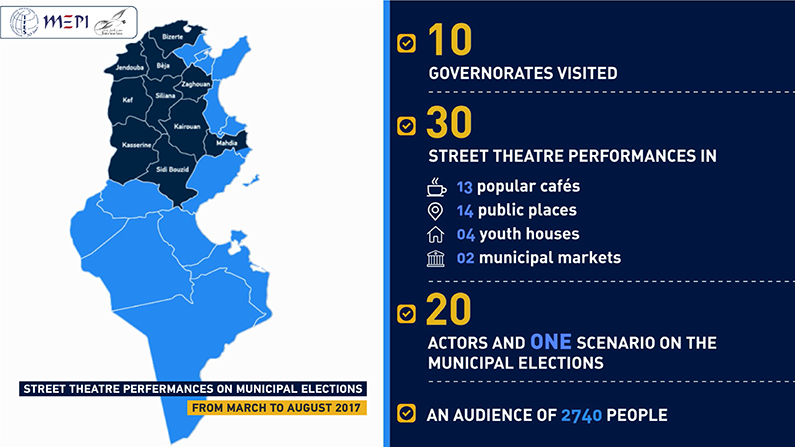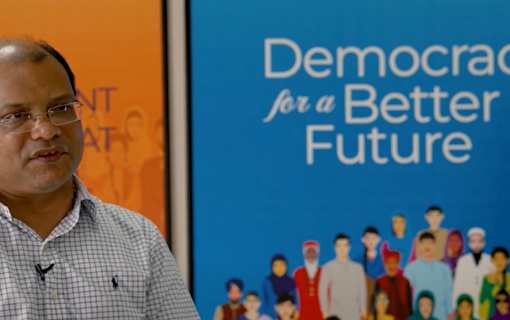
Tunisian Theater Troupe Takes to the Streets to Engage Voters on Democracy and Elections
Concerned by a growing lack of interest in democracy and elections among Tunisian citizens, especially those with low rates of literacy and education, the International Foundation for Electoral Systems (IFES) developed an innovative approach to generate excitement ahead of the May 6, 2018, municipal elections. With Tunisians growing increasingly disenchanted with the democratic transition, IFES sought to rekindle the pride and enthusiasm citizens felt following the 2011 popular uprising and their participation in the 2011 National Constituent Assembly elections. In partnership with the Theater Forum of Tunisia, a local, freelance theater troupe, IFES organized a street theater tour across Tunisia to encourage civic participation among marginalized populations who, living in remote, hard-to-access communities, lack access to information on elections, democracy, and the rights and responsibilities of citizens.
From March to August 2017, the tour visited 30 municipalities in 10 governorates with some of the highest rates of illiteracy and lowest rates of voter registration in Tunisia. The performances, which were staged in popular cafes, public spaces, youth houses and marketplaces, conveyed essential elections information to nearly 3,000 Tunisians. Sami, one of the actors, concluded, “People here live in rural areas. They lack access to information about elections and, through these performances and the Theater Forum’s techniques, we gave them an overview of elections, worked with them and interacted with them about their concerns.”
Preparing for the Show
The Theater Forum recruited 20 young actors and actresses for the play, some of whom were studying dramatic arts, while others were amateur actors. They were given only five days to draft the storyboard and rehearse. With support from IFES, the actors debated, discussed, and brainstormed content for the play, focusing on current events and issues related to local governance and elections. The outcome was a series of short scenes that described day-to-day situations and aimed to demonstrate the negative consequences of citizens’ failure to participate in elections and their communities. The scenes addressed corruption, lack of confidence in political parties, mediocre public services, widespread disappointment with the slow pace of Tunisia’s democratic transition, and endemic economic and social problems, especially youth unemployment.
In addition to tackling difficult and relevant issues, the play was designed to engage the audience in discussions with one or more actors, encouraging them to think critically about the consequences of not participating in elections or in public life. Reflecting on their creative process, Nawress, one of the actors, remarked, “We created a play from simple situations inspired from our daily life in society, focusing on theater of dialogue technique and then allows the audience to interact and try to convince the actors and the audience to vote.”
Capturing the Interest of the Audience
It was a warm morning in June 2017. The bus was ready to leave; the only equipment – a sound system, chairs, and a backdrop – were loaded. The actors climbed aboard and took their seats, excited for the trip to their destination. An hour later their bus rolled into a new town. The actors disembarked, fanning out into the streets. Some worked to erect the stage, while other began knocking on doors beckoning people to join the show. A crowd of residents of all ages, families and curious onlookers gathered, and the troupe knew it was time to start the show. This routine was repeated 30 times in 30 different municipalities, and each time with the same enthusiasm and will to engage citizens.
The audience didn’t know what to expect, so the actors used dances, games and thought-provoking statements to break the ice and encourage their audience to interact and engage with the show. Once they were warmed up, the actors captured the interest of the audience with short scenes describing day-to-day situations and illustrating the consequences of not participating in their democracy. One scene showed corrupt elected officials making decisions for the entire local community based only on the interests of those who bribe them. Another scene depicted sub-standard public services that people would not be able to improve without taking part in elections. The public started to relate and engage as they recognized situations they experience every day.
A Time for Discussion
Following the performances, the actors convened open conversations between members of the audience and the actors to create a space in which the audience could voice their concerns, express their frustration, and share their experiences. The play’s educational messages about democracy, civic engagement, local governance and municipal elections served to provoke thought, but in the conversations after the performances audience members were called on to discuss the issues with each other and to try to convince both the actors and the other audience members to vote. This represents a key aspect of the Theater Forum’s methodology, which included the active participation of audience members as the actors invited one of the spectators to become a “spect-actor,” joining the performance to try to convince one of the actors, and subsequently the audience, of the importance of voting based on the information conveyed during the play.
This part of the performance helped the audience to recognize the municipal councils’ role in improving their living conditions and their own role in electing and supervising their elected leaders.
“Not voting is no longer an option for us, because it is clear now that corruption has become a daily struggle.” – Audience member
Street Theater: A Successful Innovation
IFES developed the concept of the street theater tour as an entertaining and thought-provoking way to inform marginalized voters of their role in advancing Tunisia’s democratic transition. Statements from the audience, interviews after the show, and phone interviews one year later all indicate that the activity succeeded in its mission.
When asked about the play, audience members from the different localities declared that the play convinced them that voting is an effective way of expressing their opinions and that the play inspired them to exercise their right to vote freely.
“There are many things that need to be fixed and we, young people, should fix them by voting! Yes, my, your and everybody’s voices are determinant[s] for the future of our country, for the change we aspire to see.” – A young man from El Oueslatia, Kairouan
IFES and the Theater Forum of Tunisia also interviewed 550 spectators after the end of the shows to capture additional feedback from the audience. Seventy-eight percent stated that the play contributed to their knowledge regarding election-related themes, and 45 percent reported that they learned about the importance of elections as not only a right but a civic duty. One year later, shortly after the municipal elections of May 2018, IFES conducted a phone survey to assess what impact, if any, the street theater tour had on attendees’ participation in the elections. Eighty-two percent of those surveyed (230 people out of 450 who shared their phone number participated in the survey) remembered the play and 71 percent said that they voted in the May 6 elections. The high turnout of those who attended the play is in stark contrast with the 35 percent nationwide turnout, and even more impressive, 98 percent of those who voted asserted a desire to play an active role in their communities in the future.
Videos about the street theater tour, including testimonials, are available below.
The initiative was funded by the U.S.-Middle East Partnership Initiative (MEPI) and launched by IFES.













